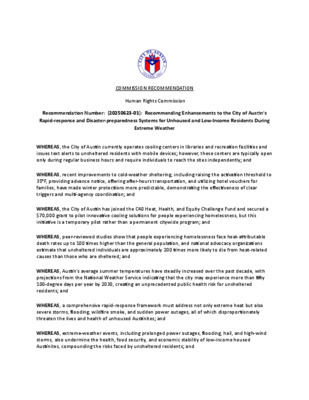Item 7: Draft Recommendation — original pdf
Backup

COMMISSION RECOMMENDATION Human Rights Commission Recommenda)on Number: (20250623-01): Recommending Enhancements to the City of Aus)n's Rapid-response and Disaster-preparedness Systems for Unhoused and Low-Income Residents During Extreme Weather WHEREAS, the City of Aus<n currently operates cooling centers in libraries and recrea<on facili<es and issues text alerts to unsheltered residents with mobile devices; however, these centers are typically open only during regular business hours and require individuals to reach the sites independently; and WHEREAS, recent improvements to cold-weather sheltering, including raising the ac<va<on threshold to 35°F, providing advance no<ce, offering aNer-hours transporta<on, and u<lizing hotel vouchers for families, have made winter protec<ons more predictable, demonstra<ng the effec<veness of clear triggers and mul<-agency coordina<on; and WHEREAS, the City of Aus<n has joined the C40 Heat, Health, and Equity Challenge Fund and secured a $70,000 grant to pilot innova<ve cooling solu<ons for people experiencing homelessness, but this ini<a<ve is a temporary pilot rather than a permanent citywide program; and WHEREAS, peer-reviewed studies show that people experiencing homelessness face heat-aUributable death rates up to 100 <mes higher than the general popula<on, and na<onal advocacy organiza<ons es<mate that unsheltered individuals are approximately 200 <mes more likely to die from heat-related causes than those who are sheltered; and WHEREAS, Aus<n’s average summer temperatures have steadily increased over the past decade, with projec<ons from the Na<onal Weather Service indica<ng that the city may experience more than fiNy 100-degree days per year by 2030, crea<ng an unprecedented public health risk for unsheltered residents; and WHEREAS, a comprehensive rapid-response framework must address not only extreme heat but also severe storms, flooding, wildfire smoke, and sudden power outages, all of which dispropor<onately threaten the lives and health of unhoused Aus<nites; and WHEREAS, extreme-weather events, including prolonged power outages, flooding, hail, and high-wind storms, also undermine the health, food security, and economic stability of low-income housed Aus<nites, compounding the risks faced by unsheltered residents; and WHEREAS, households living paycheck-to-paycheck oNen must discard hundreds of dollars’ worth of perishable food aNer mul<-day outages and may face urgent home or vehicle repairs that, if unaddressed, threaten employment and housing stability; and WHEREAS, peer Texas ci<es have shown that rapid, needs-based grants of $500–$1,000 can avert cascading crises by helping residents replace lost food, secure safe shelter, and restore transporta<on within days of a disaster; and NOW, THEREFORE, BE IT RESOLVED BY THE HUMAN RIGHTS COMMISSION OF THE CITY OF AUSTIN: The Human Rights Commission recommends the Aus<n City Council direct the City Manager to develop, fund, and implement an integrated Extreme Weather Rapid Response and Disaster Preparedness Plan for unsheltered residents, building upon current systems and address exis<ng gaps. Addi<onally, recommend the City Manager establish, iden<fy, and appropriate funding for a Citywide Emergency Climate Impact Assistance Fund that issues one-<me, needs-based grants (up to $1,000) to income- eligible housed residents. BE IT FURTHER RESOLVED, THE HUMAN RIGHTS COMMISSION OF THE CITY OF AUSTIN RECOMMENDS: • The plan to establish clear, data-driven ac<va<on thresholds for extreme heat, cold, severe storms, and air-quality emergencies, modeled on the current cold-weather shelter protocol but applied consistently throughout the year. • The City to extend cooling center hours to operate overnight during Excessive Heat Warnings, designate at least one 24-hour respite hub with medical triage services, and deploy mobile hydra<on sta<ons in central, high-traffic areas. • The Homeless Strategy Office, the Office of Climate Ac<on and Resilience, Aus<n Public Health, Aus<n-Travis County EMS, and local nonprofit outreach teams to form a standing Extreme Weather Incident Command Group to meet before each high-risk season, conduct preparedness drills, and coordinate transporta<on, supplies, and real-<me communica<on during ac<va<ons. • The plan to expand the City’s exis<ng text alert system to reach all known unsheltered individuals, offer mul<lingual voice and SMS op<ons, and integrate push no<fica<ons through the 3-1-1 app. • The City Manager to iden<fy capital funding to pre-stage shade structures, water tanks, backup generators, and portable cooling and hea<ng equipment at recrea<on centers, libraries, and partner faith-based facili<es for rapid conversion to emergency shelters when needed. • The City to track health outcomes, shelter u<liza<on, and iden<fied service gaps aNer each ac<va<on, and publish an annual Extreme Weather Impact Report to guide future planning, resource alloca<on, and improvements. • The City is encouraged to pursue federal resilience grants, philanthropic partnerships, and private-sector support to supplement public investment and to formalize the roles of volunteer medical and mental health professionals during emergency responses. • The City Manager is suggested to establish a Citywide Emergency Climate Impact Assistance Fund, providing one-<me grants not to exceed $1,000 per household for verified food loss, essen<al home repairs, or vehicle damage resul<ng from a declared extreme-weather event or related power outage. Eligibility criteria shall priori<ze households at or below 80% of Area Median Income (AMI), residents with disabili<es, and neighborhoods experiencing repeated infrastructure failures based on zip code. • Applica<ons for the fund to be accepted in person at Resilience Hubs and online through a mobile-friendly, mul<lingual form, and the City to target a turnaround <me of no more than 14 days from applica<on to payment. • Every fund recipient to automa<cally receive a referral to Aus<n Energy’s Weatheriza<on Assistance Program, Flood-Risk & Atlas 14 mapping tools, the Get Back in Business small-business portal, and the Urban Forest Grant program to convert emergency relief into long-term household preparedness. • The City Manager to seek federal reimbursement (e.g., FEMA Individual Assistance) and cul<vate philanthropic or private-sector partnerships to replenish the Fund aNer major events, and shall report to Council within 60 days of each disbursement period on households served, dollars expended, and lessons learned. Date of Approval: _____________________________ Record of the vote: AUest: _____________________________________________